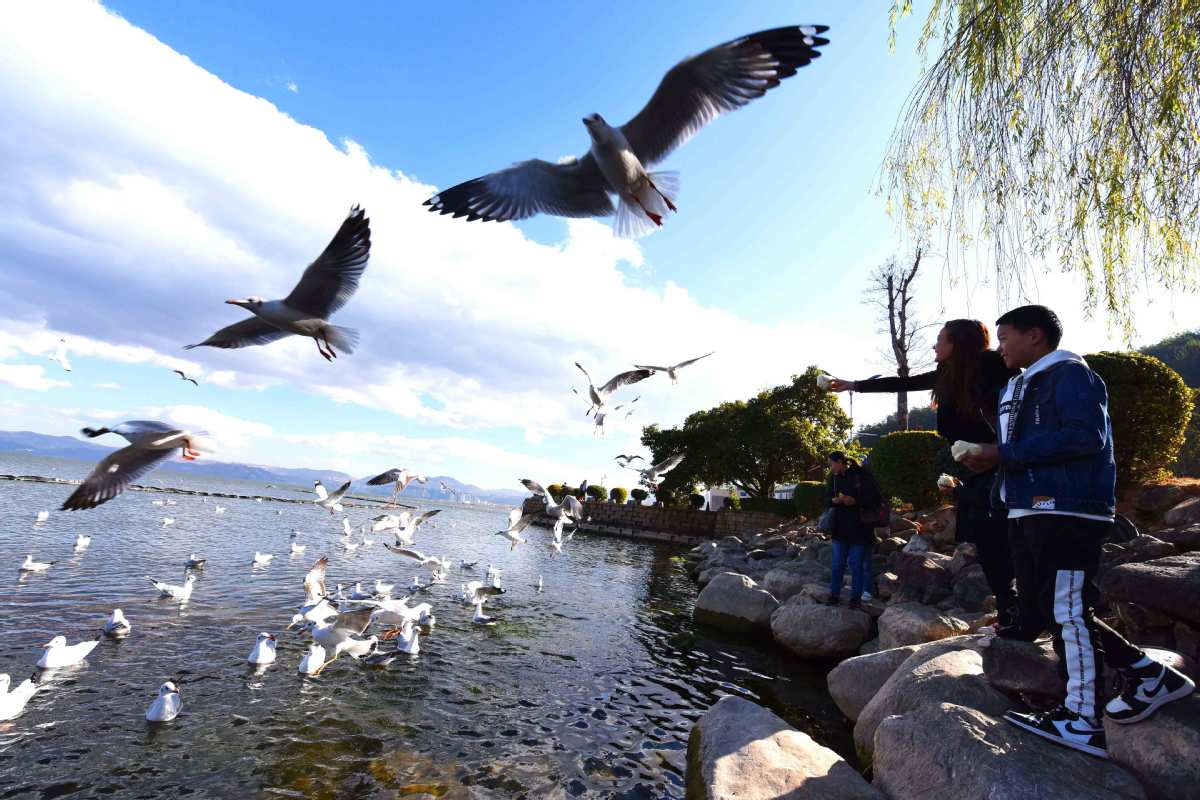
From the People's Daily app.
And this is Story in the Story.
Dali, a lakeside city in Yunnan province in China's southwest, has been seeing a steady influx of people moving there from the big cities in search of an idyllic lifestyle.
A rough estimate by the local government suggests about 40,000 newcomers are living in the city. Many people decided to leave their jobs and move to Dali from large cities such as Beijing, Shanghai and Guangzhou, capital of Guangdong province, due to work pressures and surging property prices.
With an increasing number of newcomers arriving, Dali's tourism and real estate markets have prospered since 2015. According to the local government, 24 percent of property in the city was bought by new arrivals in 2015. Two years later, the number had risen to 60 percent.
A source at Yunnan Shili Real Estate Development Group said many people buy on impulse, as compared with housing prices in big cities, those in Dali are low, adding that some tourists buy a property during their travels.
However, many people's dreams of finding a better life in Dali have not turned out the way they planned and they are starting to leave.
Today's Story in the Story looks at what it is about Dali that makes some people leave after relocating there yet makes others want to stay.

Erhai Lake offers stunning scenery. (Photo: CHINA DAILY)
"If you are not satisfied with your life and don't know why you have lost your smile; if you are unhappy and don't like being where you are, go west - with Dali your destination."
Those lyrics are part of a song in the Chinese blockbuster movie Breakup Buddies, which was shot mostly in Dali and released in 2014. The film inspired many middle-income earners tired of the hustle and bustle of urban life to quit their jobs in big cities and move to Dali.
Chu Xiaogui, an author of popular books who moved to Dali from Beijing with her husband in December 2015, said she had since witnessed many friends leaving and returning to their hometowns.
As a professional writer, Chu has interviewed dozens of people from across the country who moved to Dali. She and her husband, who help organize activities such as gardening, hiking and cycling for newcomers, have a big circle of friends who have relocated to the city.
"People have different reasons for leaving, ranging from the need to take care of elderly parents who have stayed in their hometowns, to taking their children back to big cities for better education," she said.
People are also leaving because after two or three years without work, they need to find paid employment.
According to Chu, most of those moving to Dali are middle-income earners with higher-education backgrounds. "They are not billionaires, but they can afford to buy a house and live a decent life, even without a job, for three or five years," Chu said.
"Most important, they came to Dali with the idea of living a slow, simple, idyllic lifestyle that is different to that in the big cities. Some say their dreams have already come true, but others feel they made the wrong decision."

Erhai Lake offers stunning scenery. (Photo: CHINA DAILY)
Wang Yan, a businesswoman from Chengdu, capital of neighboring Sichuan province, moved to Dali in 2014. She is among thousands of newcomers who operate guesthouses around Erhai Lake, which offers stunning views that provide an escape from urban life.
The 50-year-old, who now wants to leave the city and return to her hometown, said her decision to operate guesthouses in Dali had turned out to be a mistake, as it had left her heavily in debt.
With the tourism industry expanding rapidly in Dali, wastewater and garbage were often found being disposed of directly into the lake due to insufficient or dilapidated facilities on the shore, creating one of the lake's major sources of pollution.
Since October, a widespread environmental campaign has escalated and more than 1,800 lakeside properties within the protection zone - including 540 guesthouses - have been demolished.
As the premises Wang operated were within the protection zone, which lies within 15 meters of the shoreline, they were demolished, and she will be compensated by local authorities. However, Wang said she does not believe the money can make up for her losses.
Many of the nonlocals who have chosen to remain in Dali, which also attracts a lot of foreigners, believe their new lives are good. British writer and illustrator John Pym moved there with his wife in 2005. Ten years ago, their son was born. Seven years ago, they opened a coffee shop.
Pym published the Dali Sketchbook in 2017 which illustrates his favorite Dali customs, food and natural beauty. Some say it could even be a travel guide.
"I feel that life is still very good. I can do the job I like and my child is happy here. We can be close to nature and relax," Pym said.
(Produced by Nancy Yan Xu, Brian Lowe, Lance Crayon, and Chelle Wenqian Zeng. Music by: bensound.com. Text from China Daily and CGTN.)


